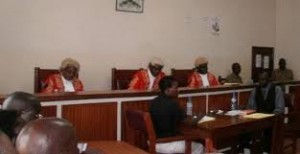Kwoyelo trial may affect LRA defections – analyst
By Our Online Team
1st Aug 2011:
Writing on the UN’s IRIN news website, Ashley Benner, a Policy Analyst with the Enough Project, has warned that the trial of Thomas Kwoyelo, a former Lord’s Resistance Army (LRA) rebel, could have the effect of discouraging further defections from the rebel group’s ranks. “…While it may satisfy northerners’ desire for justice, there are concerns over its impact on future LRA defections”, Benner said.
Kwoyelo was charged with war crimes, including murder and kidnapping in various northern Uganda locations, on 11 July in Gulu. He denied the charges. Benner says the Kwoyelo trial sends mixed messages to current LRA fighters and commanders.
“…On the one hand, the Amnesty Act guarantees amnesty for the LRA, and leafleting and radio programmes provide assurances that they can defect without fear of prosecution. On the other hand, the Amnesty Commission has been inconsistent in granting amnesties, and the Ugandan High Court has begun prosecuting a mid-level LRA commander who has been refused amnesty”, Benner said.
Kwoyelo’s amnesty application was referred to Uganda’s Constitutional Court for interpretation on 25 July. The Amnesty Act provides that people who meet the amnesty requirements, including renouncing and abandoning involvement in the war or armed rebellion, cannot be prosecuted or punished for crimes covered by the act in Uganda.
Benner added: “…In order to make real progress toward diminishing the size and strength of the LRA, Kampala should fully resume granting amnesties, publicly clarify the application of the Amnesty Act and reinstate formal channels for joining the Ugandan army”.
Echoing this, Ned Dalby, analyst at International Crisis Group (ICG), said: “…Unfortunately, the trial does little to reassure LRA fighters still in the bush in the DRC [Democratic Republic of Congo] and the CAR [Central African Republic] that if they surrender they will be offered amnesty and be able to return home. LRA combatants need to see escape and return as a viable option to fight and flee”, Dalby said.
According to a new Oxfam survey, LRA attacks continue in the DRC, resulting in 26 deaths and 23 kidnappings in June alone. The head of Oxfam in DRC, Pauline Ballaman, said: “…Small mobile groups of hungry LRA fighters continue to viciously target the most isolated and forgotten people in northeastern DRC. Despite past military operations and increased international attention, the LRA is still able to wreak havoc in neglected communities and is responsible for widespread killings, abductions and displacement”.
Selective justice?
There have also been concerns about whether the ICD court, set up in 2007 after the incorporation of the International Criminal Court’s Rome Statute, lacks the required international procedures to provide Kwoyelo a fair trial and sufficiently protect witnesses.
However, ICD presiding Judge Dan Akiiki-Kiiza said: “…We are going to ensure justice is delivered; the court is competent to handle cases of such magnitude”. According to Stephen Oola, head of research and advocacy at the Refugee Law Project, Kwoyelo’s trial is important as it brings about a “semblance of justice”.
“…The challenge is [what] about [the] other senior LRA commanders who have been let off the hook? What we need is to achieve our goal of accountability and reconciliation and this should mean justice should not be selective,” said Oola.
The Ugandan government appeared to be using the Kwoyelo trial to show it is taking on board the need for justice and accountability in the aftermath of the northern Uganda conflict, said ICG’s Dalby.
“…It [the case] is high profile and very visible both at home and abroad. It may well satisfy some northerners’ desire for justice at the national level but is unlikely to speed up the slow process of reconciliation between aggressors and victims within and between communities. This is the real challenge facing the government and people of Uganda,” he said.
Kwoyelo is accused of attacking an internally displaced persons camp in Pagak where several civilians were killed between 1992 and 2005, laying ambushes along the Gulu-Juba road, destroying civilian property and abducting children in the Awer, Bira, Oputure and Pogo villages.
In August 2010, he was charged with wilful killings, hostage taking and extensive destruction of property in Amuru and Gulu districts. However, a former LRA major, John Ogil, said Kwoyelo’s LRA duties mainly involved manning the sick bay in Kilak with limited field operations.
Under orders
Former LRA high-ranking commanders, such as Brig Kenneth Banya and Otto, have all received amnesty under the act over the last several years, according to Human Rights Watch.
Kwoyelo’s mother, Roselina Oyella, told IRIN her son was acting on the orders of his superiors. “…My son was abducted when he was barely 15 years [old]; he committed the crimes on [the] orders of commanders like Vincent Otti, [Kenneth] Banya and others”, Oyella said.
At least 60 witnesses, most of them war-crime survivors in the north, are expected to give evidence at the trial, which according to the defence lawyer, Caleb Alaka, will help in healing the affected communities, albeit with “an impact on amnesty”. END. Please login to www.ugandacorrespondent.com every Monday to read our top stories and anytime mid-week for our news updates.
![]()


